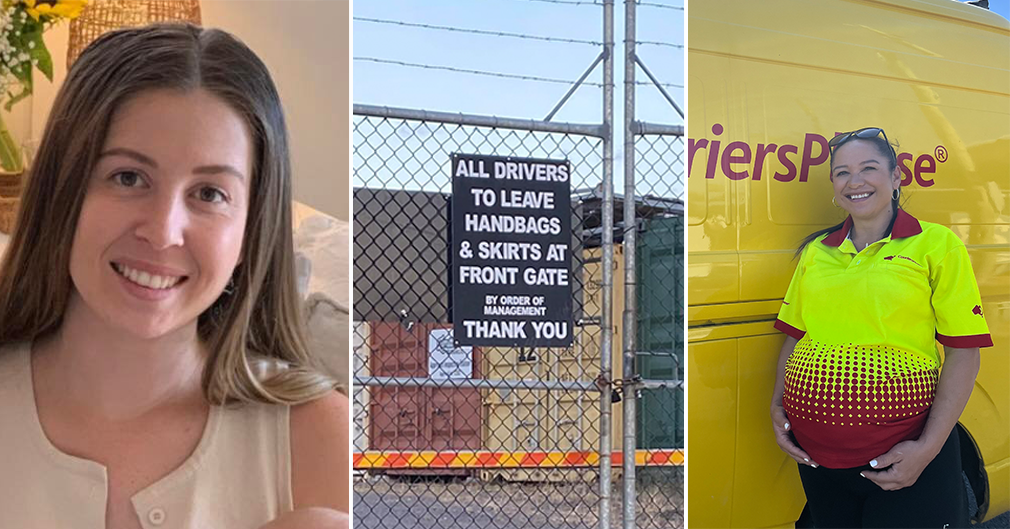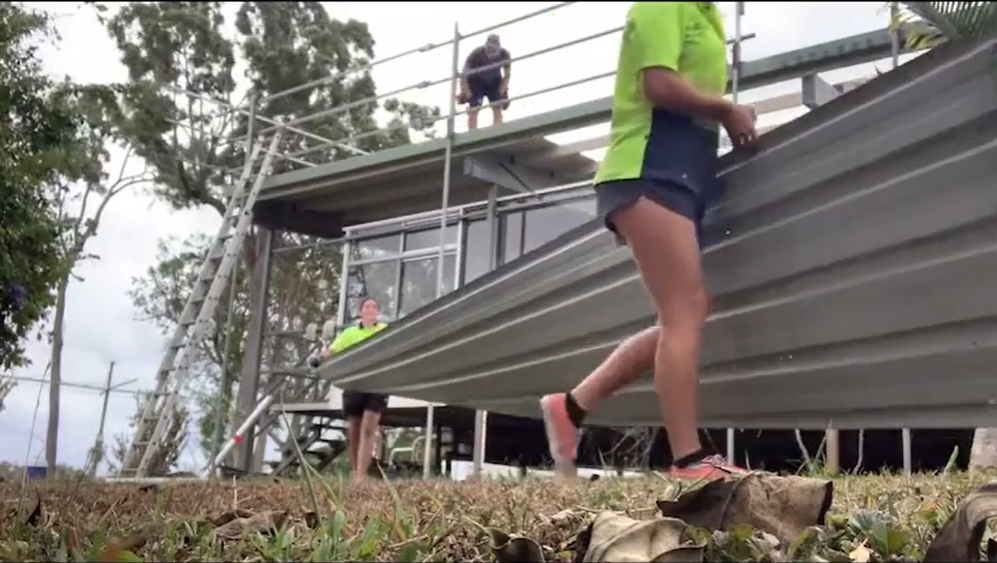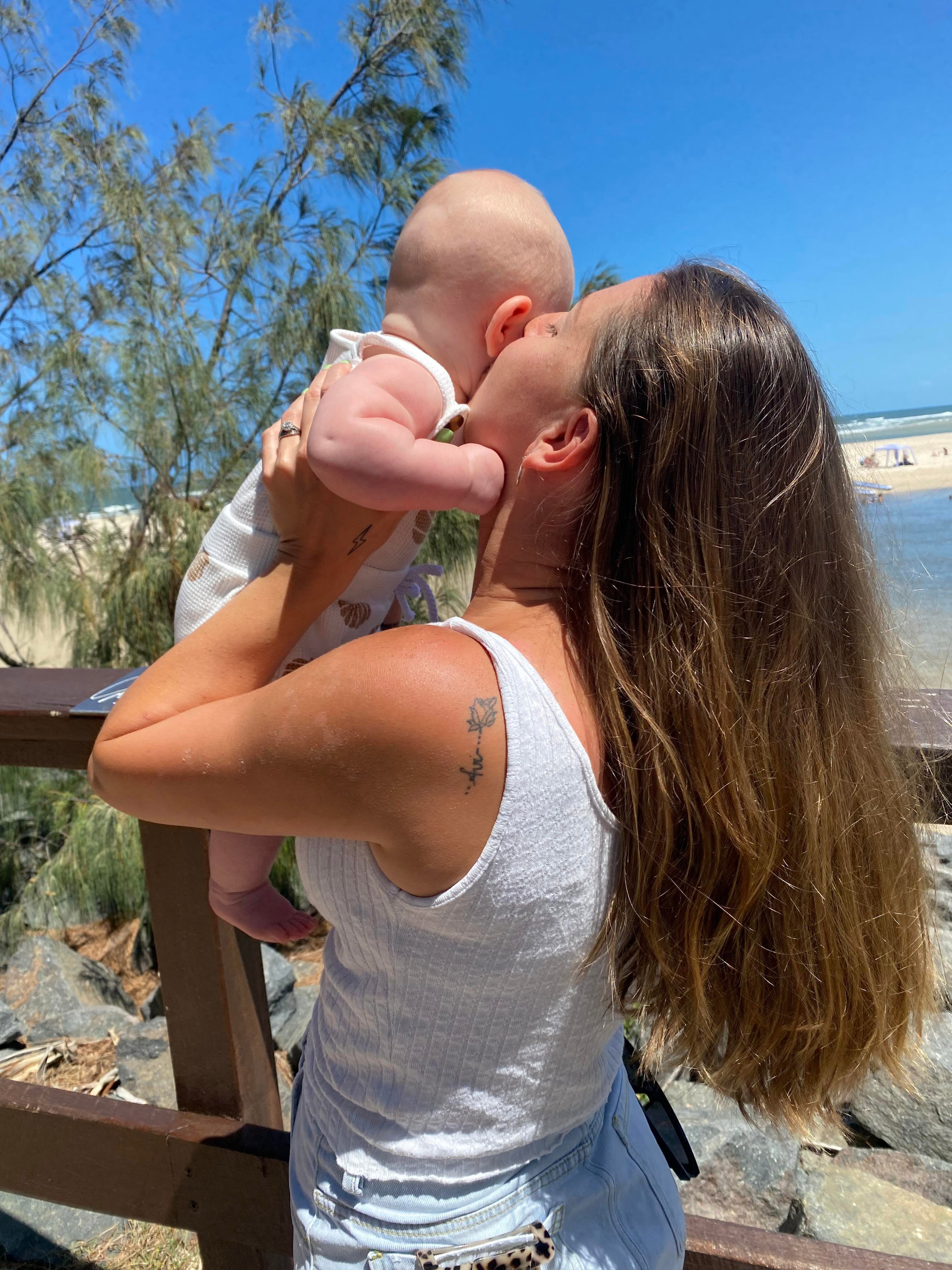Shannon has been delivering parcels for 18 years, but she still has customers telling her she shouldn't be doing it because "it's a man's job".
Tayla had people tell her "girls shouldn't be on work sites" when she was working as a roofer right up until she had her daughter last year.
Teagan says she has experienced "every sexist joke under the sun" from customers while working at a mechanic shop.
The three women work in different industries around Australia. They say they are massively supported by their employers but they still see attitudes of sexism in the greater community, perpetuated through old-fashioned stereotypes of what constitutes "a woman's job".
READ MORE: The superannuation figure Australia has forgotten

'Girls on the job, something will go wrong'
Shannon Menzies, 40, told 9news.com.au that her employer of nearly two decades, Couriers Please, had been great at supporting her as a woman and a mother.
The Brisbane woman, who runs a Couriers Please franchise, said the company had been very understanding of her need to juggle work and caring for her children, allowing her flexibility with her schedule.
"Especially because for a period there was a single mum, so they knew my children needed me."
But she said she still often delivers to customers who express surprise that she's not a man.
"They say, 'You shouldn't be doing this for a job. This is a man's job'," Menzies said.
She said she also regularly has people ask her, "How do you carry that?"
The comments have become much more frequent since she fell pregnant with her third child.
Have you got a story? Contact Serena at serena.seyfort@nine.com.au

From early on in her pregnancy, she said people were telling her she should be at home instead of working, even though she felt completely up to doing her job.
She said she couldn't understand that some men had been referring to her as "superwoman" when she was working while four months pregnant.
"I'm pregnant - there's not something seriously wrong with me where I can't work," she said.
Menzies said she tried not to let sexist comments frustrate her and simply told people, "'it's not just a man's job. Anyone can do it'.
"Anyone can do anything male or female," she said.
She is now training her niece to take on her role while she is on maternity leave.
Teagan Wyles, 22, gets similar sexist treatment from customers while working as a receptionist at a mechanic shop in northern Queensland, and has done for the past six years.
"I've heard pretty much every sexist joke under the sun," she said.
"I work in a male-dominated industry, so (sexism is) something I come across quite a lot."
Tayla Bear, 24, shared a video of her and a female co-worker laying metal roofing on TikTok and had a man comment, "two girls on the job, something will go wrong".
But the sexism Bear has experienced while working has come from all angles - not just customers.
'I'd like to put those legs on me'
While working as a roofer around Queensland in the five years until the end of 2021, Bear said she was regularly the victim of sexist comments from other tradies.
"Those were really common," she said.

She said she would be told "you can't lift that", as she was lifting the item.
Some of the comments were even of a sexual nature.
Bear said she would pull up some of the guys on their comments, but that she let them roll off of her.
"I'm pretty good at just handling myself," she said.
"To work in construction at all you've got to have a pretty solid backbone and tough skin."
Bear could handle the comments, but she knows a lot of people would rightfully be bothered by them, and can't understand why they are still made.
"Why is sexism still so common in trade industries?
"It's comments like that that would actually stop women from going into the trade at all."
Bear has since moved to working in administration for a roofing company since having her daughter a year ago, but she is confident there is still sexism on worksites.
Just last month she was appalled to drive past a company yard and find a sign affixed to the gate reading: "All driver to leave handbags and skirts at front gate by order of management."

Bear believes tackling sexist attitudes needs to begin at an early age.
"I think they have to ingrain it into everyone early on at school age that that stuff isn't OK."
Cultural change needed to boost female tradies
Bear's experiences echo the findings of a study by Charles Sturt University on the issue of a lack of women in trades.
Supervising researcher Dr Donna Bridges has told The Australian Financial Review the study found culture is a serious barrier to more women taking up trade roles.
"Due to the tradition of trades as jobs for men, women aren't often accepted into the environment – either because their peers and employers don't believe they can do the work, or they believe women are moving in on men's jobs," Dr Bridges said.
"Our recent study has also identified a devaluing of women based on gender bias, and the view that it's acceptable to sexually tease and joke around with women."
Dr Bridges said she found that solving the culture problems would be complex, suggesting one solution could be prioritising trade students learning "standards of respectful and lawful behaviours at work".
"Another strategy might include training teachers to counteract sexism and tokenism in the classroom, particularly recognising and preventing sexual harassment.
"Such strategies would contribute to an environment of trust and strengthen positive relationships between tradeswomen, their male peers, and teachers in the VET sector."
Sign up here to receive our daily newsletters and breaking news alerts, sent straight to your inbox.
